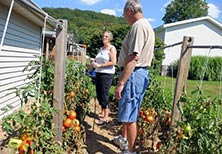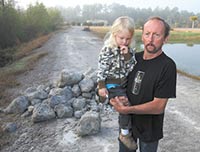West Virginia Rep. David McKinley is a man on a mission — to save the coal industry from the bullies at the U.S. Environmental Protection Agency. McKinley’s afraid that the EPA may eventually require coal-fired utilities to contain their coal ash so it’s not allowed to continue to pollute our waterways. But McKinley is not alone — he had some help from the American Legislative Exchange Council, or ALEC, the organization currently under fire for providing industry the means to unduly influence our elected officials.
McKinley’s bill, H.R. 2273, would literally prevent the U.S. Environmental Protection Agency from protecting families from the water and air pollution associated with poor storage and disposal of coal ash, the toxic remnants of coal-burning.
Last Wednesday, McKinley attached the entire toxic bill as an amendment to the “must-pass” House version of the Transportation Bill. With the Senate version already passed a few weeks ago, there will now be a conference of House and Senate members to hammer out the final Transportation bill.
The passage of this coal ash bill would have real consequences for real people. Just ask Steven Johnson, Gloria Dorsett, Robert Deveaux and Donna Keiser, whose lives have been forever changed by the toxic menace of coal ash.
In Florida
, we have Steven Johnson, whose dream home near a preserved wetland in northeast Florida is now ruined from toxic coal ash that was sold to him as structural fill. When his soil was “…compared to the median level of metals in soils across Florida, arsenic was tested to be 45 times higher than the median level in soils.”………………
Gloria Dorsett of Juliette, Ga. “recently sold her white brick house on Luther Smith Rd. to Georgia Power and moved away. She had spoken to The Telegraph and written letters to a local paper in prior years, complaining of the ash eating away at her home and causing her to have nosebleeds, among other health problems.” Dorsett lived across the street from Plant Scherer, the largest power plant in the country.
Researchers from the University of Georgia recently found high levels of uranium in drinking water wells in Dorsett’s community. The story recently garnered national coverage as a CNN story.
………………
63-year-old Robert Deveaux had plans to retire to his family’s land in Richland County, S.C. “As a kid, I grew up fishing in that river,”he told The State Journal. In 2009 it was discovered that “arsenic-tainted runoff that in places measured several feet wide” were leaking from SC&G’s coal ash ponds directly into the Wateree River.”
Deveaux’s reaction? “This makes me very angry and very frightened.” And rightfully so. The Southern Environmental Law Center is now suing SC&G to hold them accountable.
………………
In North Carolina, dried coal ash dust floats onto Donna Kaiser’s home and patio in Arden, N.C., just south of Asheville. Her community of Julian Trails lays just several hundred feet from the edge of one of the coal ash ponds owned by Progress Energy; in fact, you can see the ponds from her bedroom. She says her vegetables in her garden came out deformed and she hadn’t put two and two together until the French Broad Riverkeeper came knocking on her door to ask her about the coal ash ponds.
Watch a TV report about the Progress Energy coal ash pond (opens in new window).
………………

Curt Havens and his wife are afraid to eat their vegetables because they live so close to Little Blue coal ash pond
McKinley’s own constituents in Chester, W.Va. are suffering from the impacts of coal ash from Little Blue coal ash pond, the largest coal ash pond in the country. “At a congressional hearing last spring, resident Curt Havens described how the toxic ash impoundment was gushing water contaminated with cadmium, a cancer-causing metal, near his home. He also explained to Rep. McKinley and the subcommittee that he had thyroid cancer and his wife has thyroid disease—illnesses caused by cadmium exposure.”
………………
These cases are only the tip of the coal-ashberg. Most people do not even know if they live near a coal ash pond, even though there is a 1-in-50 chance that you will develop cancer if you do.
But the unfortunate truth is that there are more standards for your kitchen trash than for toxic coal ash ponds. Coal ash is so unregulated, you can even buy some off of Craig’s List.
“I have as much coal ash as you can haul it can be used for alot of different things. Take all you want or all of it if you want free you load.”
Please email your Senators today and ask that they vote against any amendments that weaken federal protections on coal ash.





Leave a Reply